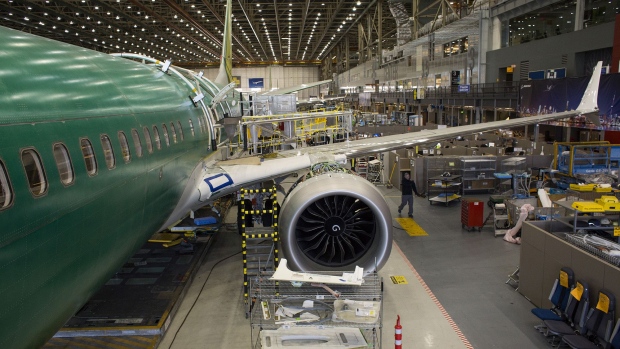Jun 15, 2020
Boeing Max Return in Europe at Risk of Delay Over Travel Rule
, Bloomberg News

(Bloomberg) -- The return of Boeing Co.’s 737 Max to European skies is at risk of additional delays because U.S. coronavirus travel restrictions have hindered planning for test flights by regulators from the continent.
The European Union Aviation Safety Agency will perform its flight tests on the grounded Boeing jet after the U.S. Federal Aviation Administration conducts its own, said Janet Northcote, a spokeswoman for the European regulator.
The Max was banned from commercial flying by governments around the world in March 2019 after two fatal crashes, and efforts to re-certify the plane have been marked by repeated delays. Bloomberg News reported last week that Boeing was closing in on the final steps needed to return the plane to market. Boeing tentatively targeted later this month to host U.S. regulators on a flight test, a crucial step in the FAA’s evaluation of the upgraded jet, people familiar with the matter said then.
Read: Boeing Max Nears Milestone With Key Flight Targeted for June
EASA’s technical investigation of the Max’s upgraded systems hasn’t been completed, Northcote said. U.S. restrictions on entry for EU nationals have prevented the Cologne, Germany-based agency from firm planning for a test flight, she said in an email.
The FAA, which is taking the lead on recertifying the 737 Max and will conduct the first governmental flight test, said it has measures in place to proceed when Boeing has completed the necessary work. The FAA didn’t comment on EASA’s plans. Boeing spokesman Bernard Choi declined to comment.
Coronavirus Restrictions
Unprecedented efforts taken by governments to control the spread of the coronavirus have already slowed work on the Max’s return. The slump in air travel from the pandemic has meanwhile quashed demand for new planes, easing pressure to complete the fix.
The U.S. said in March that European nationals from the Schengen area that includes Germany were barred from visiting the U.S. with certain exceptions. The restrictions with Europe, the U.K. and other countries such as Brazil could last for months, U.S. infectious-disease expert Anthony Fauci told the Hill this week.
Chicago-based Boeing has estimated that it will spend nearly $20 billion on compensating customers, keeping suppliers afloat and restoring the production of jets. Its most recent goal has been to return the 737 Max, a critical source of revenue, to commercial service in the third quarter.
Northcote didn’t say how much time the entry restrictions would potentially add to delays in the recertification process. EASA head Patrick Ky has said that the regulators were working in concert and that Europe would lag behind the U.S. by two to three weeks in clearing the jet.
Last year the two authorities sought to resolve differences over the Max’s architecture, including a reliance on fewer angle-of-attack sensors than its European rival Airbus SE -- instruments that are thought to have played a role in the crashes in Ethiopia and off Indonesia. Some changes to software or hardware may be installed through routine maintenance checks after the plane is back in use, a person famiiar with the matter said then.
Boeing is expected to commit to developing a synthetic air-speed system or adding a third sensor to measure air speed in a compromise with EASA, the Air Current reported last week.
©2020 Bloomberg L.P.